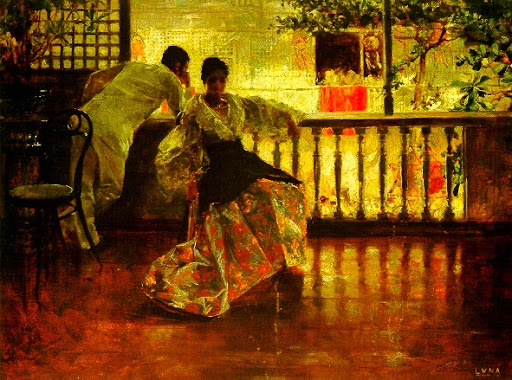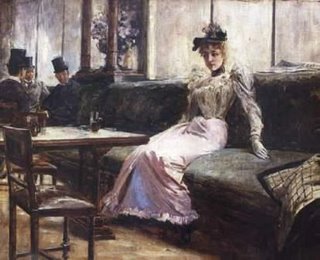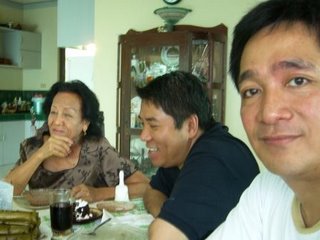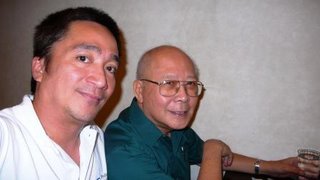skip to main |
skip to sidebar
Sid Gomez Hildawa (1962-2008)
In Absentia
The sadness within these walls is the quiet
sadness of space itself; invisible, inescapable.
And hollow, like a forgotten well I'd like to fill up
with flood waters, lava, or quick-drying cement.
Departures are never as swift as the flick of a light
switch, or as definitive as the collapse into dust
cloud and rubble of a tall building under engineered
blasts of planted dynamite. You walk out in particles,
leaving granulated good-byes like very fine sand. I'm
sure some remnant of your reflection is still around,
bouncing off yet another conniving surface. Like once,
stepping out of the shower towel-drying my hair,
I caught the elongated image of your tanned body
mirrored by the metal door frame's shiny handle. So
you're still within these walls, zipping in perpetual
motion, an amorphous mass of energized atoms in some
theoretical physics equation where the effect of
friction is suspended. You're still here, though
not as I would have it: seated on the bed, your back
against last night's pillows, your arm outstretched,
pointing the remote control at a flickering screen.
You're here in fragments. I gather your presence
with each sweeping of the floor, the way a poem
remembers its former drafts, collecting dead skin
cells of former selves.
(Fifth Prize Meritage Press Awards 2003)
Sid’s Note at Meritage site:
My poem, "In Absentia," is a product of many personal concerns as both poet and architect. Among them are, "How is one's perception of space affected by the physical absence of the beloved?," and, " What does it really mean to be present in the physical world, for oneself and for someone else?" The writing of this poem led me to meta-physical possiblities, with links to the nature of writing itself.
Pictura Poiesis Poems

On Juan Luna’s Tampuhan (1895)
It is a yellow afternoon that slides open
the capiz-shell windows,
that makes the mahogany floor
like a pond shimmer with silhouettes
of the ventanilla’s squinting fingers.
“My dear, you’re missing the procession
below.” He leans out, as if wanting
to join the shuffle of dusty feet.
She looks in, anchored to wooden things.
the yellow light passes without a sound
between them.

Sick Leave
(On Luna’s Parisian Life)
Like a patch of skin spared
from sunburn by a shield
of cloth or sun block lotion,
there’s a rectangle on the wall
lighter than the wall itself,
where a painting used to hang.
Now that the artwork is gone,
visitors ask, “What used to be there?,”
and “What was it about?,”
as if they hadn’t seen the piece before,
or maybe not carefully enough.
‘Wasn’t there a woman seated
in a café?, Didn’t she have a glass
of wine, or some company?,”
The damp ground, eavesdropping,
almost shifts, holding up the house
whose wall holds up a rusty nail
in its perpetual upturned pose,
holding up no answer.
On my fourth day in hospital
with dextrose feeding me twenty
drips a minute, I picture in my mind
a space I may have left behind,
not entirely empty, but of air
made thinner by my absence,
or of lighter tissue,
so that people pause, inquire,
and imagine what used to be there.
“So where’s the painting now?
Undertow
There is no smell of chlorine
to pierce the nose. In this river
water enfolds me clear
and flowing, currents without waves.
My legs are flourescent pale
underneath, where small fishes
mingle with the bathers, unperturbed,
except by the occasional dives.
I see you coming out
of the waterfall, your body
cutting through the white curtain
whose long hair parts only for the enchanted.
And the enchanting.
Better than misty air
there is liquid bridge between us now
and if my enduring wish were electricity
I would have touched you,
and warmed this river for you.
But fear of intrusion engulfs me
and the undertow of possible rejection
pulls me down, down
to drown with the stones
petrified, the algae,
the dead leaves decaying.
Ticket
What I keep in my wallet is evidence
of another time: as I unfold this small piece
of paper, its creases transform into furrows,
then forks in a road more tentative
than a typhoon’s turns. You’re seated
beside me again, stringing stories with songs
like multi-colored beads as the window world
becomes a blur of buildings, trees, and electric poles
that could be the ones running outside
while our bus stayed in place. It didn’t matter then.
We had left everything behind that day for a lunch
three hours away and five hours back;
grilled freshwater fish with coconut milk
by the banks of a lake so calm its ripples
resembled rings 0f a tree trunk centuries old,
so that while the afternoon sun was busy
untying its shoes, one could count the age of the water.
It was not too long ago when I stopped
at twenty-seven and said to myself this is the year
I would like to relive over and over again,
come back to like an earmarked page when,
coming to the last few chapters of a novel,
one can already sense how it would probably end:
the lake concealing its lines, the sun disrobing,
dipping into the pool, the bus heading back to the city.
A passenger looking out the window,
with a return ticket in his wallet.
The Space of Today
today doesn't occupy space;
today is the space.
today doesn't consume time;
today is the time.
i am the occupant,
i am the consumer.
i am in today like a bullfrog in its mudhole
croaking the minutes of eternal night,
the rain pouring from the sky-pitcher
to the basin of earth; water soaking
everything, every thing.


 Sid, certainly like every younger artist, though he had won his own awards and had made a name for himself, was happy to be in the company of the greats, here with three national artists and one historian: Mom Edith Tiempo and historian and columnist Ambet Ocampo, the kindly Dr. Bien Lumbera, and Rio Alma at the Pictura Poiesis poetry night at MagNet in November last year
Sid, certainly like every younger artist, though he had won his own awards and had made a name for himself, was happy to be in the company of the greats, here with three national artists and one historian: Mom Edith Tiempo and historian and columnist Ambet Ocampo, the kindly Dr. Bien Lumbera, and Rio Alma at the Pictura Poiesis poetry night at MagNet in November last year




 Sid, certainly like every younger artist, though he had won his own awards and had made a name for himself, was happy to be in the company of the greats, here with three national artists and one historian: Mom Edith Tiempo and historian and columnist Ambet Ocampo, the kindly Dr. Bien Lumbera, and Rio Alma at the Pictura Poiesis poetry night at MagNet in November last year
Sid, certainly like every younger artist, though he had won his own awards and had made a name for himself, was happy to be in the company of the greats, here with three national artists and one historian: Mom Edith Tiempo and historian and columnist Ambet Ocampo, the kindly Dr. Bien Lumbera, and Rio Alma at the Pictura Poiesis poetry night at MagNet in November last year









No comments:
Post a Comment